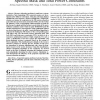Free Online Productivity Tools
i2Speak
i2Symbol
i2OCR
iTex2Img
iWeb2Print
iWeb2Shot
i2Type
iPdf2Split
iPdf2Merge
i2Bopomofo
i2Arabic
i2Style
i2Image
i2PDF
iLatex2Rtf
Sci2ools
146
click to vote
TSP
2010
2010
Cooperative resource allocation games under spectral mask and total power constraints
Resource allocation problems in multi-user systems, modeled as Nash bargaining (NB) cooperative games, are investigated under different constraints. Using the joint time division multiplexing and frequency division multiplexing (TDM/FDM) scheme as a manner of cooperation in the NB resource allocation game with only spectrum mask constraints (SMCs), it is shown that the efficiency of the corresponding solution depends on both the interference-to-signal and interference-to-noise ratios of the users. Sufficient conditions under which the joint TDM/FDM based NB solution outperforms a noncooperative Nash equilibrium solution are derived and shown to be mild. A semi-distributed algorithm is proposed for finding the NB solution of the corresponding game with SMCs only. The NB based resource allocation game with both SMCs and total power constraints (TPCs) is shown to be a nonconvex optimization problem of high complexity. For such a game, a classification of two-user systems into bandwidth- a...
Artificial Intelligence | NB Resource Allocation | Resource Allocation | Resource Allocation Problem | TSP 2010 |
Related Content
| Added | 22 May 2011 |
| Updated | 22 May 2011 |
| Type | Journal |
| Year | 2010 |
| Where | TSP |
| Authors | Jie Gao, Sergiy A. Vorobyov, Hai Jiang |
Comments (0)

